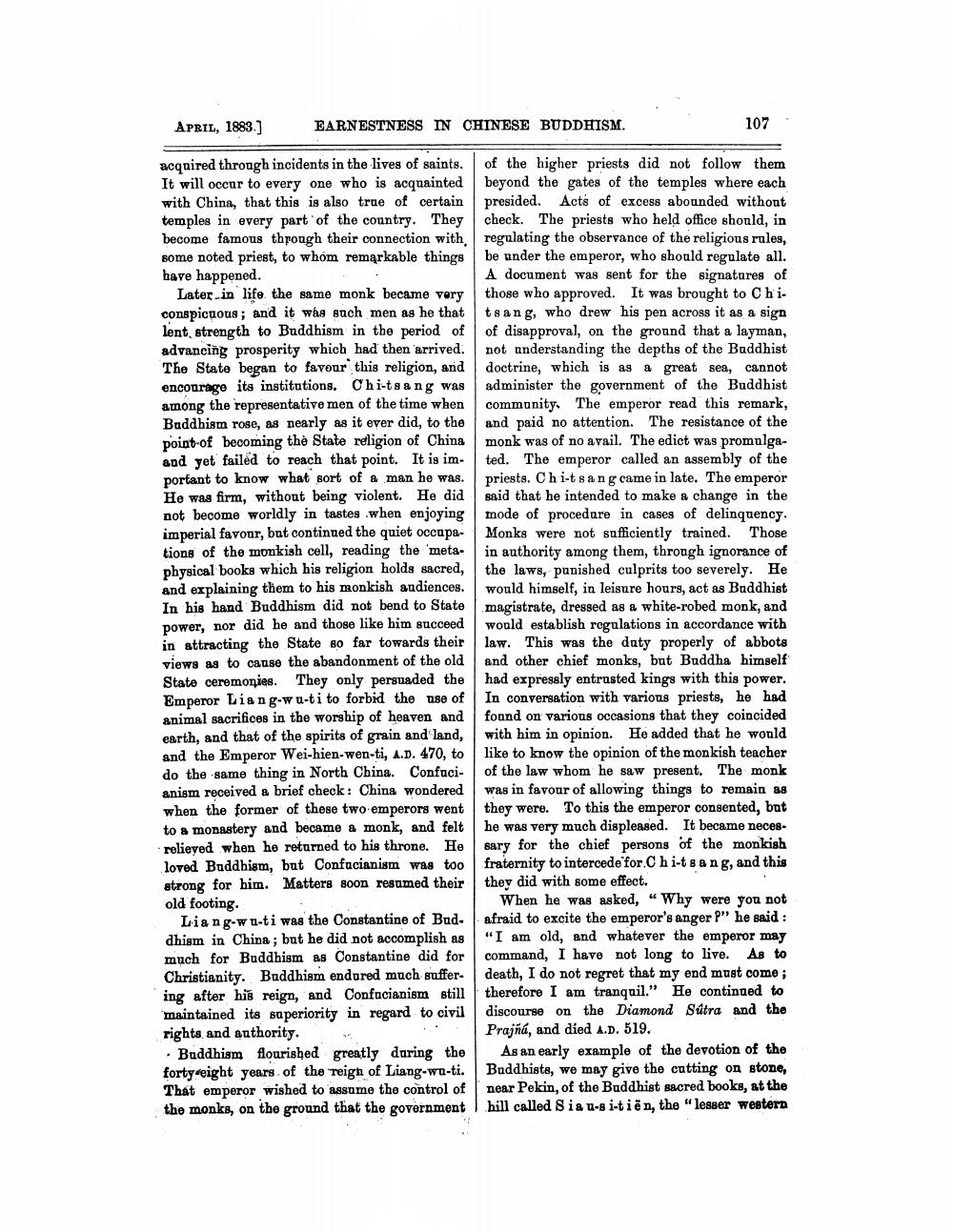________________
APRIL, 1883.]
acquired through incidents in the lives of saints. It will occur to every one who is acquainted with China, that this is also true of certain temples in every part of the country. They become famous through their connection with, some noted priest, to whom remarkable things have happened.
Later in life the same monk became very conspicuous; and it was such men as he that lent strength to Buddhism in the period of advancing prosperity which had then arrived. The State began to favour this religion, and encourage its institutions. Chi-tsang was among the representative men of the time when Buddhism rose, as nearly as it ever did, to the point of becoming the State religion of China and yet failed to reach that point. It is important to know what sort of a man he was. He was firm, without being violent. He did not become worldly in tastes when enjoying imperial favour, but continued the quiet occupations of the monkish cell, reading the metaphysical books which his religion holds sacred, and explaining them to his monkish audiences. In his hand Buddhism did not bend to State power, nor did he and those like him succeed in attracting the State so far towards their views as to cause the abandonment of the old State ceremonies. They only persuaded the Emperor Liang-wu-ti to forbid the use of animal sacrifices in the worship of heaven and earth, and that of the spirits of grain and land, and the Emperor Wei-hien-wen-ti, A.D. 470, to do the same thing in North China. Confucianism received a brief check: China wondered when the former of these two emperors went to a monastery and became a monk, and felt relieved when he returned to his throne. He loved Buddhism, but Confucianism was too strong for him. Matters soon resumed their old footing.
EARNESTNESS IN CHINESE BUDDHISM.
Liang-wu-ti was the Constantine of Bud. dhism in China; but he did not accomplish as much for Buddhism as Constantine did for Christianity. Buddhism endured much suffering after his reign, and Confucianism still maintained its superiority in regard to civil rights and authority.
Buddhism flourished greatly during the forty-eight years of the reign of Liang-wa-ti. That emperor wished to assume the control of the monks, on the ground that the government
107
of the higher priests did not follow them beyond the gates of the temples where each presided. Acts of excess abounded without check. The priests who held office should, in regulating the observance of the religious rules, be under the emperor, who should regulate all. A document was sent for the signatures of those who approved. It was brought to Chitsang, who drew his pen across it as a sign of disapproval, on the ground that a layman, not understanding the depths of the Buddhist doctrine, which is as a great sea, cannot administer the government of the Buddhist community. The emperor read this remark, and paid no attention. The resistance of the monk was of no avail. The edict was promulgated. The emperor called an assembly of the priests. Chi-t sang came in late. The emperor said that he intended to make a change in the mode of procedure in cases of delinquency. Monks were not sufficiently trained. Those in authority among them, through ignorance of the laws, punished culprits too severely. He would himself, in leisure hours, act as Buddhist magistrate, dressed as a white-robed monk, and would establish regulations in accordance with law. This was the duty properly of abbots and other chief monks, but Buddha himself had expressly entrusted kings with this power. In conversation with various priests, he had found on various occasions that they coincided with him in opinion. He added that he would like to know the opinion of the monkish teacher of the law whom he saw present. The monk was in favour of allowing things to remain as they were. To this the emperor consented, but he was very much displeased. It became necessary for the chief persons of the monkish fraternity to intercede for. C h i-t sang, and this they did with some effect.
When he was asked, "Why were you not afraid to excite the emperor's anger ?" he said: "I am old, and whatever the emperor may command, I have not long to live. As to death, I do not regret that my end must come ; therefore I am tranquil." He continued to discourse on the Diamond Sútra and the Prajñá, and died A.D. 519.
As an early example of the devotion of the Buddhists, we may give the cutting on stone, near Pekin, of the Buddhist sacred books, at the hill called S ia u-s i-tien, the "lesser western




